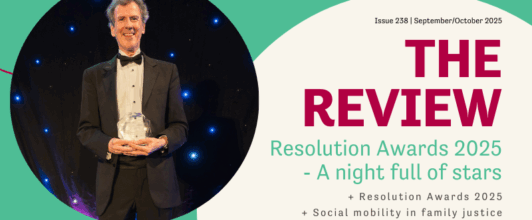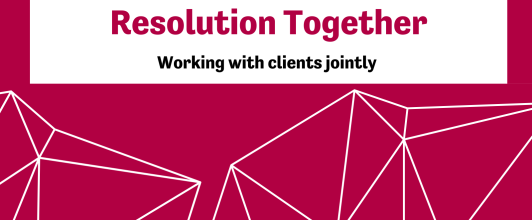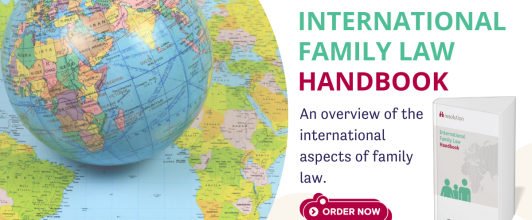
The Review
The Review is Resolution's bi-monthly magazine for members. Publishing six times a year with a mix of features, law and practice and news from the regions.
Broad range of information for professionals and practitioners in family law and justice.
Showing 341 - 360 of 518

The Review is Resolution's bi-monthly magazine for members. Publishing six times a year with a mix of features, law and practice and news from the regions.

Resonate is a new blog from Resolution, bringing together voices from across family law to share insight, experience and both personal and professional perspectives
As part of Resolution's Code of Practice members are asked to use the Good Practice Guides as part of their day to day work. These represent Resolution's core values and are designed to offer knowledge and guidance to our members.

Resolution Together is a way of working that allows lawyers to work with and advise couples jointly, including providing appropriate legal advice, through a divorce or separation.

Find resources on mediation, collaborative practice, arbitration and more.

This list of recommendations of family lawyers in other jurisdictions has been compiled by the members of Resolution's International Committee based on their working experience. The lawyers on this list are not Resolution members - unless indicated - and as such are not endorsed or recommended by Resolution.
Ruth Hare, Director of Reach Psychology Ltd and Associate Member of Resolution reveals how her personal experience of collaborative divorce led to an interest in lawyer well-being, revealed a new community of practice and led her career in an unexpected direction.
Nick Wyn-Williams, Partner at Rees Page who represented Ruth’s ex-husband, reflects on being part of ‘team Hare’, and his insights from having a mirror held up to the collaborative process by a psychologist.
As dispute resolution practitioners, we constantly find ourselves navigating private aspects of human relationships and emotions. An experienced family lawyer and mediator confided in me that she did not feel competent in handling the emotional aspects of disputes. As a psychologist, I often feel equally inadequate in dealing with the legal elements of family disputes. Our individual experiences with collaborative practice revealed how an integrated and interdisciplinary approach to dispute resolution can be mutually beneficial to our practice while also improving the quality of service for our clients.
Resolution’s response to the Domestic Abuse Working Group of the Family Justice Council.
In this podcast, Ian Hawkins, Mary Waring, and Phil O'Connor discuss the many benefits that can be obtained from including a financial neutral within a collaborative meeting.
Public Sector Pensions have changed over the years, meaning that we now have a number of different sections within each scheme. This can make it confusing when it comes to trying to negotiate a settlement for Pension Sharing.
For example, it is not always obvious at what age a pension credit will be paid and if there are a number of sections to a scheme, will one Annex share them all?
In this article, we take a closer look at the Unfunded Public Sector Schemes – these are the ones that do not have a pot of money behind them, so a Pension Sharing ex-spouse is offered internal membership, rather than an external transfer out.
Draft legislation has been released which will impact divorcing or separating couples who are disposing of their main residence and/or transferring ownership to their former spouse or civil partner.
In this article for The Review Alison Palmer examines how the new rules will in most cases result in additional capital gains tax (CGT) by reducing the reliefs available. Some practical examples illustrate how the timing of transactions can have a significant impact on the resulting tax liability. As always, timing and detail are all-important in maximising the relief available, so professional tax-planning advice can be exceptionally valuable in such cases.
Hannah Saxe (Irwin Mitchell) and Richard Adams (Starke & Co) from Resolution's Cohabitation Committee discuss how to draft cohabitation agreements using Resolution's tools and resources.
Moher v Moher provides a useful round up of how the courts should approach non-disclosure, as well as some thoughts on the interaction of an order to make periodical payments with the grant of a get.
The Child Poverty Action Group (CPAG) works for the more than one in four children growing up in poverty. This article for the Review takes a look at their work.
The ability to benefit from an ex-spouse’s superior national insurance (NI) contribution history on divorce, at no cost to either party, is one of the least-understood areas of pensions on divorce. Yet it can literally be life-changing for lower earners, and it takes only a matter of minutes to explain to clients. This article for The Review explores the issues of this topic.
Find out more about the LAA's work to reduce the amount of bills rejected.
Apply is a new digital service which will be replacing CCMS when making applications for legal aid.
Resolution has published its response to the President of the Family Division's report on medical expert witnesses in the family courts.
An update in The Review on the parenting workshops and outreach programmes run by Kids Come First.
Must the judge who was present at the FDR hearing be disqualified from considering those points? This was the question that needed to be determined in the recent High Court case of Shokrollah-Babaee v Shokrollah-Babaee. Austin Chessell reports for The Review.
Alex Laing and Greg Williams report on The Court of Appeal judgment on Inheritance Act claims out of time for The Review.
In this article from The Review Edward Cooke analyses the activity of the private children law working group put together by the President of the Family Division, Sir Andrew McFarlane.
Natalie Gamble and Kelly Blaxall examine the recent ruling of the President of the Family Division in Re TT [2019] EWHC 2384 and its significance one for transgender and non-binary parents who conceive children after transitioning in this article from The Review.
In this article for The Review Graeme Fraser reports back on the Dispute Resolution Conference family justice Question Time from the DR Conference 2019
In this article for The Review Gemma Hope reports back on the "Using words well: how we can find solutions through language" workshop from the DR Conference 2019